The Man Who Would Be King Blu-ray Movie
HomeThe Man Who Would Be King Blu-ray Movie 
Warner Bros. | 1975 | 129 min | Rated PG | Jun 07, 2011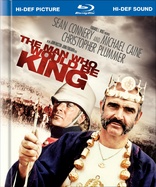
Movie rating
7.7 | / 10 |
Blu-ray rating
| Users | 4.2 | |
| Reviewer | 4.5 | |
| Overall | 4.2 |
Overview
The Man Who Would Be King (1975)
Adaptation of Rudyard Kipling’s story about two English ex-soldiers who leave British-ruled India for a remote part of Afghanistan in order to become kings.
Starring: Sean Connery, Michael Caine, Christopher Plummer, Saeed Jaffrey, Doghmi LarbiDirector: John Huston
| Adventure | Uncertain |
| Action | Uncertain |
Specifications
Video
Video codec: MPEG-4 AVC
Video resolution: 1080p
Aspect ratio: 2.40:1
Original aspect ratio: 2.39:1
Audio
English: DTS-HD Master Audio Mono (48kHz, 24-bit)
Subtitles
English SDH, French, Spanish
Discs
25GB Blu-ray Disc
Single disc (1 BD)
Playback
Region free
Review
Rating summary
| Movie | 4.5 | |
| Video | 4.0 | |
| Audio | 3.5 | |
| Extras | 1.5 | |
| Overall | 4.5 |
The Man Who Would Be King Blu-ray Movie Review
God(s) save the King(s).
Reviewed by Jeffrey Kauffman May 27, 2011By the mid-1970’s, writer-director-actor John Huston probably had little left to “prove” to Hollywood, and yet there he was, still going strong. 1974 had seen him give one of his most acclaimed, if creepy, performances, as the main villain in Roman Polanski’s Chinatown. And after a fairly spotty run of directorial efforts, 1975 suddenly saw him reinvent the big screen adventure epic with a startlingly entertaining adaptation of Rudyard Kipling’s The Man Who Would Be King. Huston had always been a writer and director who loved to peek into the unseemly underbelly of morally ambiguous characters, something that had been part and parcel of his oeuvre from The Maltese Falcon on. But never before had Huston wrapped this penchant toward examining human foibles in such an exotic and large scale production, and The Man Who Would Be King stood as probably the best overall film of the last few years of his career (some might make a convincing argument for Prizzi’s Honor, but to my tastes, The Man Who Would Be King is the much more solid and satisfying picture). Kipling was, like Huston himself, a cunning and provocative examiner of human hubris, arrogance and a seemingly self-destructive penchant for self-aggrandizement that in Kipling’s case was often melded hand in glove with a caustic analysis of British Imperialism. Probably nowhere in Kipling’s output was that jaundiced perspective so brilliantly on display as in The Man Who Would Be King, and Huston’s own cynical perspective simply became the filmic icing on the cake. The Man Who Would Be King is a brisk and breezy (and often surprisingly funny) entertainment that is in its own perfect popcorn munching fare, but which upon further examination displays a rather amazing amount of nuance and commentary on a number of sociopolitical elements.
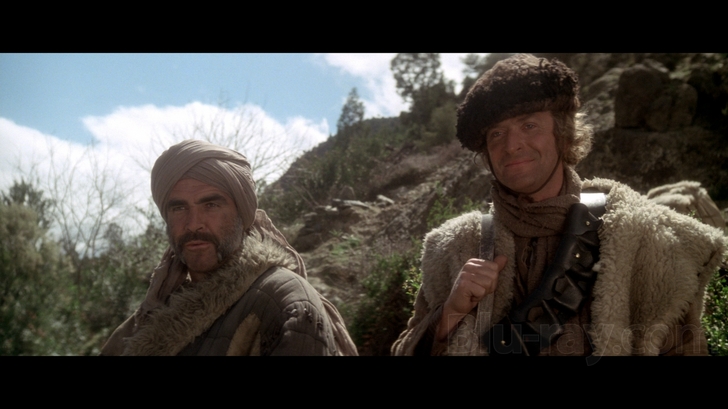
The film is told in flashback, as Rudyard Kipling (Christopher Plummer) meets the crazed remains of an old friend, the wonderfully named Peachy Carnehan (Michael Caine). Peachy has obviously seen better days, and seems but one breakdown away from permanent institutionalization (something that in fact befalls him in the original Kipling version, but which is not depicted in the film version). Peachy launches into a frankly unbelievable tale of his exploits with another former NCO of the British Raj, Danny Dravot (Sean Connery). Years previously, the two had met with Kipling, telling him then of their perhaps delusional plans to forage north of the Khyber Pass into a no man’s land known as Kafiristan, an area where previous explorers had disappeared and about which few had any definitive information.
The main secton of the film then plays out, as Peachy and Danny first befriend a Nepalese soldier named Billy (Saeed Jaffrey) who speaks English and helps them as a translator. Peachy and Danny soon ingratiate themselves as advisors of sorts to a village which has been repeatedly attacked, and they soon martial enough native forces to decimate the village’s nemeses, using time honored British military strategy. A chance encounter with an arrow which bounces off of his clothing makes Danny appear to be a God to the naďve natives. That sets into motion a cartwheeling series of events where Danny (with Peachy’s assistance) manages one stinging defeat after another to any native forces standing in their way, until they have more or less conquered the entire region.
Things get really convoluted at this point, as Danny and Peachy are summoned to a holy site where Danny, due to his ability to withstand the literal slings and arrows of a marauding tribe, is going to be “inducted” as an official God. Things don’t go exactly as planned, and without posting any spoilers, suffice it to say that a perhaps unbelievable coincidence saves the pair, at least from external forces. What begins to actually lead to their ultimate fate is decrepitude of a more internal nature, especially on the part of Danny, who soon comes to believe that he is indeed a God, at least compared to the supposedly “savage” natives of this remote area.
The film is a fairly ecumenical criticizer in terms of both the British “eminent domain” attitudes on display, at least by Danny (though Peachy isn’t above reproach in that regard), as well as the obviously atavistic way of life of the natives. What’s really quite interesting in this adaptation though is Huston’s perhaps surprising decision to cast Connery as the charlatan and Caine as the (relative) voice of reason. (There's little doubt of course that both of these characters are "scoundrels," to borrow a term from another great Caine film, but only Danny goes completely off the deep end here). A casual look at these actors’ film personae would suggest that Caine really should have played Danny and Connery Peachy, but this change up sleight of hand is actually what gives The Man Who Would Be King so much of its edge. And whether it was the chance to play at least slightly against type, or the influence of Huston, or a combination of the two, Caine and Connery have rarely been better, especially considering how unusual their roles are.
The other bracing aspect of The Man Who Would Be King is how seamlessly Huston blends an old school, Hollywood Golden Era epic with a more modern, decidedly cynical overview of the subject matter and in a way the very epic genre in which he’s working. But of course that had more often than not been Huston’s modus operandi, taking a well worn filmic trope and subtly turning it inward and giving it a jaded and disillusioned patina. But what repeatedly impresses about the film is that it can be taken merely on its surface level as a rousing adventure yarn, or for those more predisposed to critical analysis, it reveals all sorts of layers of commentary on the human condition and the political climate of Britain in the 19th century. Rarely has such a thoughtful critique been clothed in such boisterous apparel and the film’s appeal is virtually doubled as a result.
Isn’t it fascinating to realize that both Lost Horizon and The Man Who Would Be King, two completely disparate literary sources and films, have elements of the British Raj at the core of their plot setups? Lost Horizon takes place toward the end of the Raj, when the frayed seams were already beginning to show, and native uprisings were beginning to let the British know their days in the (foreign) sun were numbered. The Man Who Would Be King, on the other hand, revels in the supposed glory of the early, hubristic imperial age, for better or worse. The Man Who Would Be King might be thought of as a sort of reverse Lost Horizon in a way, or at least a slightly twisted version of James Hilton’s iconic tale. While the promise of immortality is more figurative than literal in The Man Who Would Be King than it is in Lost Horizon, it’s nonetheless the same alluring type of promise, namely of something unbelievable, which forms the foundation of both films. And as in Lost Horizon, world weary travelers find themselves in a paradise of sorts where their arrival is greeted with almost Messianic fervor. What different results, though. Lost Horizon’s hero Hugh Conway initially rejects what he sees as the chimera of Shangri-La, and then of course regrets his decision, and as the novel ends, is supposedly trying to get back to that hidden paradise (the film versions of course depicted his return). The Man Who Would Be King takes the complete opposite tack. Danny has no intention of leaving, while Peachy is desperate to escape. In both cases, their decisions lead to debilitating results, a telling critique of what Kipling may have though about the Raj.
The Man Who Would Be King Blu-ray Movie, Video Quality 
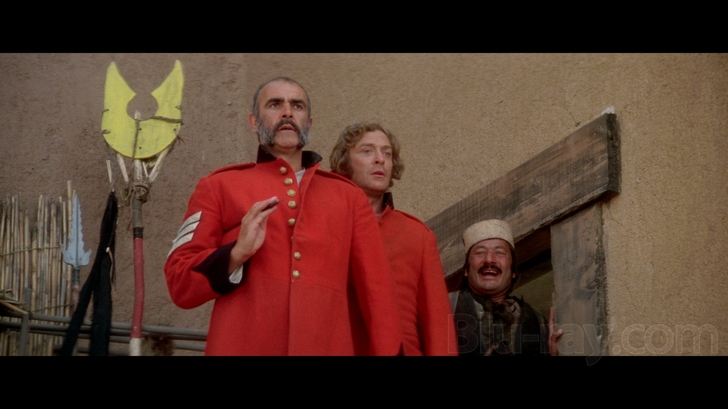
The Man Who Would Be King has always had some issues with its visual presentation, and this new Blu-ray may be faulted by some when it is really only reproducing what has always been there. Encoded via AVC, in 1080p and 2.40:1, this is an overall excellent transfer which nevertheless can't diminish some of the issues with the source elements. You may actually shriek with horror when you see the ghastly Allied Artists logo in what can only be charitably described as an ugly puke green. Things get better after that initial shock, though there are still niggling issues to deal with throughout the film. A very noticeable softness is readily apparent in many of the second unit shots, which tend to be brief establishing interstitials. The bulk of the film, at least the well lit outdoor moments (and much of this film takes place outdoors) bristles with sharpness and clarity, with exceptionally well saturated color. Reds are especially impressive, with the British uniforms virtually popping off the screen. Flesh tones can appear to be slightly on the ruddy end of things from time to time. While black levels are solid, there is minor crush in some of the darker scenes. While grain structure is still largely intact, it does appear that some moderate DNR has been applied, though it certainly doesn't rise to level we've often seen with some other studios' catalog releases. This is a distinct improvement over the SD-DVD of this title, but that said, no one should go into this feature expecting miracles.
The Man Who Would Be King Blu-ray Movie, Audio Quality 
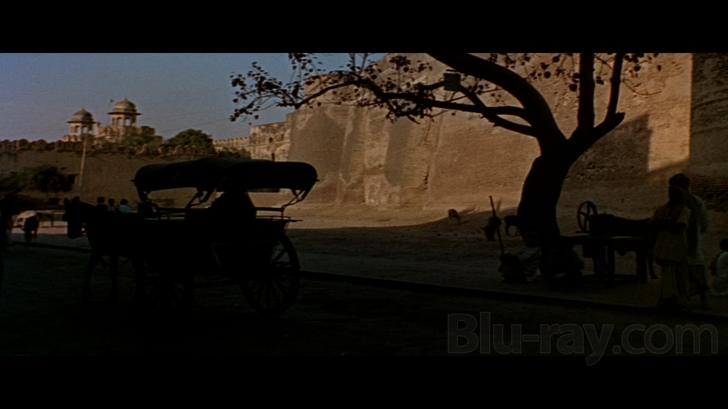
Perhaps strangely, The Man Who Would Be King has a mono soundtrack, something at least a little unusual for a mid-1970's vintage film,, and Warner has not seen fit to repurpose this film with a 5.1 track. The original mono track is offered here via a lossless DTS-HD Master Audio 1.0 track that is certainly decent, but which, like the image quality, can't quite overcome the limitations of the source elements. While the bulk of this film sounds perfectly fine, there's occasional boxiness and tinniness quite evident. A perfect example is Connery's entrance, in the train boxcar, where his first line sounds like it's being pumped in from far off Kafiristan. The soundtrack is of course very narrow, a shame considering its epic sweep and scale. Fidelity is on the whole fine, though a sometimes brittle high end is only more apparent in this lossless outing than it was in previous home video incarnations. Maurice Jarre's score sounds wonderful, and the overall mix is fulsome and enjoyable.
The Man Who Would Be King Blu-ray Movie, Special Features and Extras 
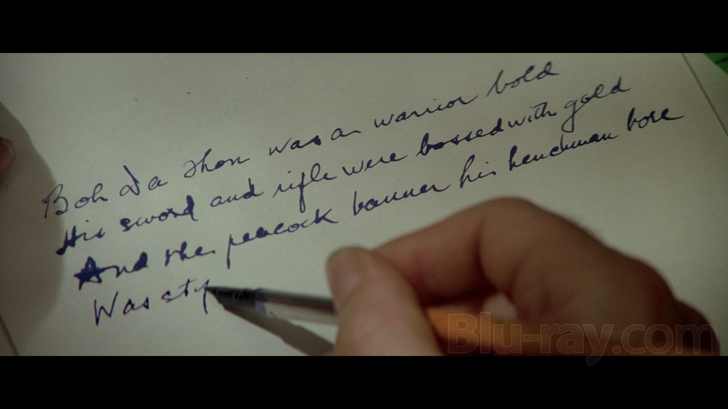
- Call It Magic: The Making of The Man Who Would Be King (SD; 12:00) is a vintage featurette showing the film in production. This has some great shots of the Marrakesh locations, including some of the mammoth sets that were built for the film.
- Trailer
The Man Who Would Be King Blu-ray Movie, Overall Score and Recommendation 
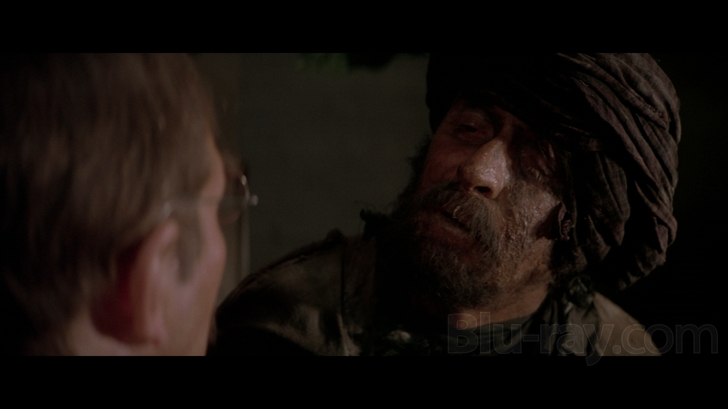
It's easy to look back on The Man Who Would Be King and simply say, "They don't make 'em like that anymore." Except you know what? They weren't really even making 'em like that back in 1975, which is why John Huston deserves so much praise for having fashioned this supposedly "old fashioned" epic from an even older fashioned literary source. But what a bracing entertainment The Man Who Would Be King is. Rarely has a "buddy film" (which really this might be thought of as being) been so filled with nuance and brilliant drama. Caine and Connery are minor revelations in their unusual roles, and Huston stages it all with panache and flair. Highly recommended.
Other editions
The Man Who Would Be King: Other Editions
Similar titles
Similar titles you might also like

Zulu Dawn
1979

The Vikings
1958

The Eagle
2011

Merrill's Marauders
Warner Archive Collection
1962

Age of Heroes
2011

The Covenant
Guy Ritchie's The Covenant
2023

Gunga Din
1939

Excalibur
1981

The Man in the Iron Mask
1977

The Blue Max
Limited Edition to 3000 - SOLD OUT
1966

Objective, Burma!
Warner Archive Collection
1945

Devotion
2022

The Long Ships
1964

Sink the Bismarck!
1960

Sharpe's Challenge
BBC
2006

Windtalkers
2002

The Dirty Dozen
1967

The Devil's Brigade
Special Edition
1968

Battle of the Bulge: Wunderland
2018

Flight of the Intruder
1991
